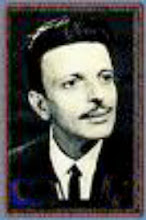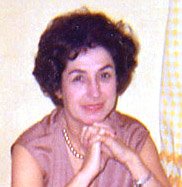PREAMBLE BY MARION WEINFELD-CUMPIANO
For a quarter of a century James Joyce wrote regularly to Harriet Weaver, a shy Quaker lady, his patron, generous benefactor, and confidante. It would be presumptuous to attempt to equate the importance of René Marqués’ letters to me with those letters, which despite the long friendship always began with the forma greeting, “Dear Miss Weaver.” My active association with René and our correspondence lasted for less than a decade and my role in his career was relatively minimal. Still, similarities can be traced between the letters of the great Irish writer to the quiet English lady a few years older than himself—one whose life style was removed in many ways from his, yet one with whom he always felt a bond of gratitude and interest—and those of the Puerto Rican playwright to me, a young matron more involved at the time with teaching and domesticity than with larger cultural affairs.
Over the stretch of years, Joyce wrote Miss Weaver of his many problems with publishers, his illnesses and family problems. More significantly, during the long gestation of the work in progress which was to become Finnegan’s Wake, he explained in detail as he went along what he was trying to accomplish in the work and the way to thread through its mazes. Even though she could not always comprehend its obscurities—and who can?—her support was unswerving. Their meetings were rare—at one time in Paris her maidenly gentility was shocked by his lack of sobriety—yet Joyce continued to share with her the minutiae of his creative process.
With the same exquisite formality and courtesy, René’s letters addressed to “Queridísima Mrs. Cumpiano” detailed his work and trials. He recounted his personal crises as they were happening; he gave his impressions and evaluations of the books he was reading, described the literary and theatrical scenes in Puerto Rico, the U.S. and Spain as he was experiencing them. He dealt, moreover, with his struggles to work out problems in his early plays and expressed his disappointments when they received adverse criticism. In these letters, too, can be read his great dedication during those difficult post-war years to improving he cultural life of the Island and awakening the still-unformed Puerto Rican mass audiences to appreciate artistic effort and talent. Especially revealing are hi apprehensions for the success of bringing to Arecibo, where he lived, the cultural opportunities which otherwise could be enjoyed only in San Juan. With his characteristic intensity, he expressed his concern about the political, as well as the cultural issues of the day and turmoil at the University of Puerto Rico.
My more conservative contrary position regarding the student unrest there exasperated him. As a continental American, I was in his mind associated with the enemy camp, but, because as friend and mentor I represented to him the larger cultural world, he retained always the deepest respect and avowed appreciation for my part in his early development
Our friendship began in Arecibo in 1940 when I was supervising the teaching of English in the local and nearby schools. He had somehow heard and been impressed by the fact that I had written my Master thesis about experimental technique in modern drama and had already begun doctoral studies in the same field. He approached me with the request to direct the Spanish play, Tu el barco, yo el navegante, which was to inaugurate the fledgling Areyto group he was forming, an offshoot of the San Juan company headed by Leopoldo Santiago Lavandero (Poldín). I argued that I was unfitted for such an endeavor. True, I had had experience acting in amateur theatricals in the U.S., but had previously directed only one play. Furthermore, my Spanish was still very limited as I had come to Puerto Rico only a few years before and was just beginning the serious study of the language. I could not dissuade him. It was easier for him to convince me to accept the challenge, for I had no other obligations that year besides my work, since my husband was at an Army camp, called in military service by threatening reports of U.S. involvement in World War II.
During the production in which René played the leading role, there were many opportunities to talk. He was eager to hear about the American theatre, which was floundering at the time. I described to him the plays of Eugene O’Neill, Arthur Miller, and Tennessee Williams, which I had seen, lent him books and suggested further reading. His curiosity was insatiable. He quickly absorbed whatever I could tell him.
After the production of Tu el barco in Arecibo, followed by a later showing in San juan, I left Puerto Rico for some months to follow my husband to an Army camp in Georgia, where my first child was born. At the outbreak of the war, I returned to Puerto Rico and began to live in Hato Rey while teaching at the University of Puerto Rico. By means of frequent letters written between 1945-1948 our friendship was resumed (travel and phone calls were not so convenient in those days as they are today).
In the few years between the time I left Arecibo until our correspondence began, René had already embarked upon his career as a dramatist and was y envisioning the production of his plays in the English-speaking world. His enthusiastic confidence in my ability led him to insist on my translation of one of his plays, anyone I should choose. Letters concerning this project followed in rapid succession—sometimes daily—but he wrote, as well, of all matter which preoccupied his fertile mind and pen.
His last preserved letter is a fitting close to our correspondence. After some disillusionment with my judgmental response to the violence at the University, he was still friendly enough to request a small service. With second thoughts about his usual formal, yet affectionate greeting, he addressed me for the first time more intimately, calling me by my own first name.
After 1948 when René moved to the San Juan area, there was no further need for letters. Although we were no longer distant in space, we met seldom. He was busily absorbed in his brilliant career writing successful plays, essays, stories, a novel, and meeting distinguished writers, intellectuals and political figures—while I was occupied, as I was, with domesticity, motherhood, teaching and studying.
Unfortunately, my many moves over the following years made it difficult for me to preserve all the letters. The seventeen extant letters totaling many thousand words, were stored for more than thirty years during my peripatetic existence and have only now been discovered. I trust that the selection here reproduced will whet the appetite of readers for the remainder. The letters that follow present a portrait of the playwright as a young man, forging like Joyce, “in the smithy of [his] soul the uncreated conscience of [his] race."
“Queridísima Mrs. Cumpiano”: Letters from René Marqués, 1945-1948
Subscribe to:
Comments (Atom)
René Marques


